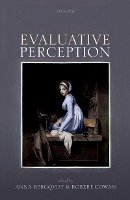Evaluation is ubiquitous. Indeed, it isn't an exaggeration to say that we assess actions, character, events, and objects as good, cruel, beautiful, etc., almost every day of our lives. Although evaluative judgement - for instance, judging that an institution is unjust - is usually regarded as the paradigm of evaluation, it has been thought by some philosophers that a distinctive and significant kind of evaluation is perceptual. For example, in aesthetics, some have claimed that adequate aesthetic judgement must be grounded in the appreciator's first hand-hand perceptual experience of the item judged. In ethics, reference to the existence and importance of something like ethical perception is found in a number of traditions, for example, in virtue ethics and sentimentalism. This volume brings together philosophers working in aesthetics, epistemology, ethics, philosophy of mind, and value theory to investigate what we call 'evaluative perception'. Specifically, they engage with (1) Questions regarding the existence and nature of evaluative perception: Are there perceptual experiences of values? If so, what is their nature? Are perceptual experiences of values sui generis? Are values necessary for certain kinds of perceptual experience? (2) Questions about epistemology: Can evaluative perceptual experiences ever justify evaluative judgements? Are perceptual experiences of values necessary for certain kinds of justified evaluative judgements? (3) Questions about value theory: Is the existence of evaluative perceptual experience supported or undermined by particular views in value theory? Are particular views in value theory supported or undermined by the existence of evaluative perceptual experience?

